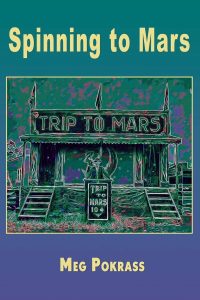
Grant Faulkner met Meg Pokrass by chance when he thought he was meeting the renowned flash fiction agent Peg Mokrass at Absinthe in San Francisco in 2010. As much as he was disappointed not to find representation for his stories, he cherished finding a flash writer who wrote with verve and dare. Meg and Grant have since gone on to found the Flash Fiction Reading Series in San Francisco with Jane Ciabattari, and they each recently published collections of short stories, Meg’s Spinning to Mars and Grant’s All the Comfort Sin Can Provide, so they sat down to have a serious-minded talk about the flash narrative.
Grant: I like to think about how flash captures life in ways that other forms might not. One way is how flash stories are erotic, how they’re a type of flirtation by definition, simply because each short is a glancing touch. How do you think flash lends itself to erotics in ways that longer forms might not?
Meg: Flash and microfiction create a feeling of intimate collaboration between reader and writer, a place that is both private and shared. If that isn’t sexy, what is?
Successful flash moves us, often in ways so subliminal we don’t realize what has happened until it’s over. The form necessitates that the writer seduce the reader in a few words, and never let go.
These are some ways that flash is a temptress. A mistress who must take us on a long journey in a minuscule period of time. That journey, though brief, provides us with a feeling of having been changed.
Meg: In your story “Morphine Drip” a son stands beside the bed of his father in a hospital, and his father is traipsing through memories and mumbling things in a half-drugged state, and he inadvertently confesses a sexual experience with a boy from his youth. He doesn’t die remembering his childhood dog, his mother, or his partner of fifty years, he dies remembering a boy called Jim with his pants down to his ankles. How are we all like this narrator? How are we attached to the darkest places of ourselves? And why could this story only work in 100 words?
Grant: A line in that story inspired the title of my recent collection, All the Comfort Sin Can Provide. The father says, “Never underestimate the comfort sin can provide. A lifetime of bedtime stories all to your lonesome.”
I think we all resemble this father because at heart we all want more, but “more” is sometimes forbidden or dangerous or self-destructive. On the other hand, “more” can be nourishing and enlivening and wondrous, even when it’s forbidden, dangerous, and self-destructive. So we’re constantly in conflict, I think, between moments when sin promises a thrill or a short-term comfort and the slices of regret or guilt that might follow. As Jung said, inside of every alcoholic there’s a seeker who got on the wrong track.
This story worked in 100 words for me because we only understand others in fragments, even those we might be closest to. The son doesn’t know that his father furtively had sexual encounters with men in his life. And then because these encounters were fleeting moments, they are just wisps the father tries to hold onto, faint memories that give him comfort before sleep, or before death in this case.
We certainly often look to what I’ll call sin as a salve for the general malaise of our lives, simply because we need to feel alive. We only have the smallest of things to hold onto in the end.
 Grant: I like the way absence forms so much of the narrative in Spinning to Mars. The absence of a father, the absence of a home, and then the presences that absence casts a light on, like the collection of marbles the father leaves behind in one story. There’s one line I particularly loved that summed it up: “She sank a wooden leaf, imagining it was her father, and still it floated.” How does an aesthetic of brevity help you evoke that tension between absence and all that absence spawns?
Grant: I like the way absence forms so much of the narrative in Spinning to Mars. The absence of a father, the absence of a home, and then the presences that absence casts a light on, like the collection of marbles the father leaves behind in one story. There’s one line I particularly loved that summed it up: “She sank a wooden leaf, imagining it was her father, and still it floated.” How does an aesthetic of brevity help you evoke that tension between absence and all that absence spawns?
Meg: This makes me think of the importance of the absent father in Tennessee Williams’ The Glass Menagerie. The father’s portrait hangs prominently in the living room of the family home. Having created a black hole in all of their lives, Mr. Wingfield’s presence continues to rule the house, and the abandonment of his family establishes their future.
Spinning to Mars is something like a fictional memoir in which ghosts live inside unlived moments, longing haunts the house of absence, and emotional fulfillment lives in eternal limbo… In a way, this really is the essence of flash. The seductive power in precisely what isn’t said.
Meg: When I was learning acting, I was instructed by an acting teacher to ‘find the sex and/or the death in every scene”. Many of your stories, even the tiniest, as in “The Tenderloin, 1997”, accomplish both things. Are you aware of working with these ideas when writing your stories?
Grant: Freud believed that Eros, the God of love, and Thanatos, the God of death, were the two drives that explained life, so if that’s true, your acting teacher had the right approach.
I’m not at all conscious of working with such notions when I write, but I’m obsessed by death and I think of my characters largely in regard to their erotic sensibility, which means more than just sex to me. I think the eros I place my characters in is a quest to hold beauty, which is inherently tragic, because there’s a contradiction in beauty: it holds the sweetness of desire (presence) and an inevitable but hidden bitterness (absence)—so flash is the perfect form to evoke this tension for me since the form is so defined by the momentary, the fleeting, by blossoms that quickly die.
Sappho used a word to describe eros that is properly translated as “sweetbitter” instead of bittersweet, which is how I like to think of it. We seek desire, sweetness, and we’re often overwhelmed by it because we seek more life. As long as we desire it doesn’t seem that we could possibly die, but death is always in the wings of desire, even as we pretend it isn’t.
________________________
Grant Faulkner is executive director of National Novel Writing Month and the co-founder of 100 Word Story. He’s the author of All the Comfort Sin Can Provide; Fissures, a collection of 100-word stories; Pep Talks for Writers: 52 Insights and Actions to Boost Your Creative Mojo; and his book, The Art of Brevity, is forthcoming in 2023. He is also the co-host of the podcast Write-minded. For more, go to grantfaulkner.com, or follow him on Twitter at @grantfaulkner or Instagram at @grantfaulkner.
Meg Pokrass is the author of 7 flash fiction collections and 2 flash novellas. Her most recent books are Spinning to Mars (Blue Light Book Award, 2021) and The Loss Detector (Bamboo Dart Press, 2020). Her work has been anthologized in 3 Norton anthologies: Flash Fiction International (W.W. Norton, 2015), New Micro: Exceptionally Short Fiction (W.W. Norton, 2018), and is forthcoming in Flash Fiction America (W. W. Norton & Co., 2023). She is the founding editor of Best Microfiction and Founding Editor of New Flash Fiction Review. Follow her on Twitter at @megpokrass

 The core workshop of SmokeLong Fitness is all in writing, so you can take part from anywhere at anytime. We are excited about creating a supportive, consistent and structured environment for flash writers to work on their craft in a community. We are thrilled and proud to say that our workshop participants have won, placed, or been listed in every major flash competition. Community works.
The core workshop of SmokeLong Fitness is all in writing, so you can take part from anywhere at anytime. We are excited about creating a supportive, consistent and structured environment for flash writers to work on their craft in a community. We are thrilled and proud to say that our workshop participants have won, placed, or been listed in every major flash competition. Community works.